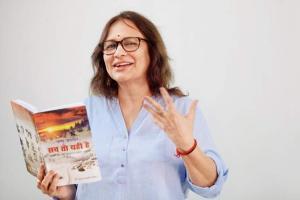A former Hindi professor of St Xavier's College turns to history to discuss the condition of refugees in Jammu and Kashmir before Article 35A was repealed, through short stories inspired by true incidents

Dr Asha Naithani Dayama
On August 5 this year, when the Indian government scrapped Article 35A, Dr Asha Naithani Dayama, said a prayer at her Kandivli home. "Who would have thought?" says Dayama, a former Hindi professor at Mumbai's St Xavier's College. Dayama wasn't the only one who did not see it coming. Last year, when she visited villages across Jammu and Kashmir to meet "West Pakistani refugees", whose ancestors had migrated to India during the Partition, it is what most of them wondered aloud: When will we be considered Kashmiri residents?
ADVERTISEMENT
Article 35A of the Indian Constitution gave the Jammu and Kashmir state legislature the right to define "permanent residents" of the state and provide special rights and privileges to those permanent residents. These included the freedom to purchase land and immovable property, vote and contest elections, seek government employment. Non-permanent residents of the state, even if Indian citizens, were not entitled to these "privileges". "Close to 70 years after India's Independence, they were still struggling to get the Permanent Residents Certificate (PRC) from the state. In the absence of a legal identity, they had no rights," she says.
A year later, these interactions have found their way to a book titled, Sach Toh Yahi Hai. It's a collection of eight short stories based on true incidents that capture the sense of despair among those living in statelessness. Interestingly, the stories were written before February and, by the time the book was published, Articles 370 and 35A had been abolished by the Indian government. With the abrogation of the laws that prevented them to settle permanently in the state, they are now legitimate residents.
Does this change make the stories redundant?
"Far from it," argues Dayama, "Reversing years of exploitation can't happen overnight." She clarifies that it's not history which she has chronicled, but human stories. "The media only talks about militancy and terrorism in Kashmir. Nobody cared to highlight the plight of these two lakh people."
In one of the stories, she writes: "Vibhajan ke dauran, Hindustan aaye Manmohan Singh aur Inder Kumar Gujral Prime Minister ban jaate hain, aur Jammu-Kashmir mein aaye hue refugees aaj bhi refugee kehlatein hai (Manmohan Singh and Inder Kumar Gujral, who came to the Indian side during Partition, managed to become India's prime ministers but those who came to J&K as refugees continue to be called refugees)."
Curiously, exploring the implications of these laws was not something Dayama thought she would enjoy. "It was straight up my sister's street," she laughs. Dr Pratibha Naithani is associate professor and head of the political science department at St Xavier's College. It was a chance conversation with her that set Dayama on the path of writing. Soon enough, she was researching online literature and culling out the contact of social activists from the region. "One morning, I told my husband, I want to go to Kashmir," she says. This would be one of the many trips that she would make to villages along the International Border (IB) between India and Pakistan.
"I have visited and lived with the refugees. Initially, they were suspicious about a stranger coming to their door." With the help of social workers, Dayama managed to gradually forge a bond. "Some of them were in their late teens when they migrated and were surprisingly able to recount the time with astounding detail."
The book also covers the plight of other communities, including the Valmikis, Gorkhas and women from the state who married "outsiders" and had to forgo their rights, including the right to property. In 1957, when the sanitation workers of J&K went on strike, the state government invited families of the Valmiki Dalit community from Punjab to work as sweepers but did not acknowledge them as permanent residents.
Dayama plans to visit the villages once again next year. "When the abrogation was announced, I received text messages from several of them. I have no idea how they managed to do that in the face of the phone ban. They just found a way to share their joy with me."
Catch up on all the latest Mumbai news, crime news, current affairs, and also a complete guide on Mumbai from food to things to do and events across the city here. Also download the new mid-day Android and iOS apps to get latest updates
 Subscribe today by clicking the link and stay updated with the latest news!" Click here!
Subscribe today by clicking the link and stay updated with the latest news!" Click here!






